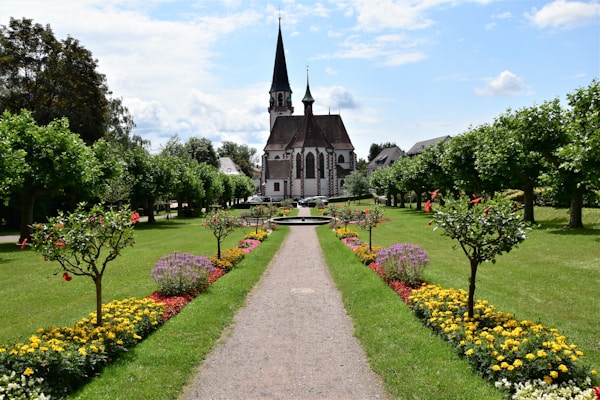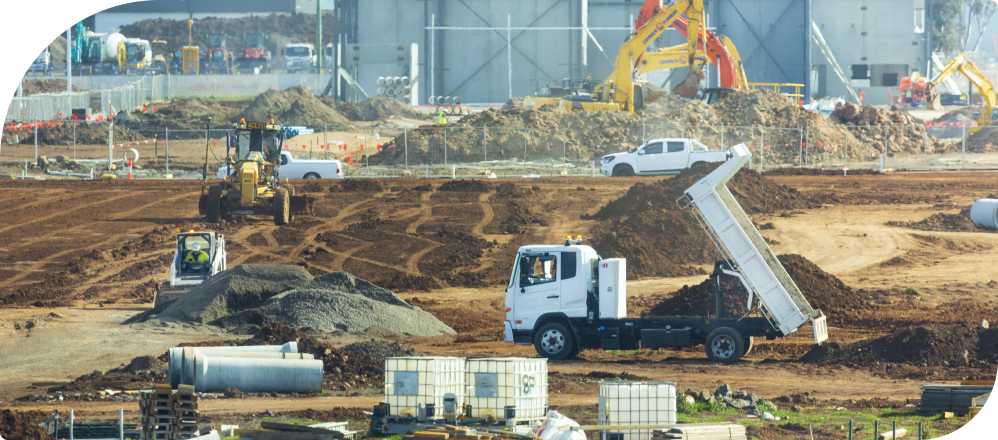Foundries & Manufacturing

Overview
The manufacturing and foundry industry, in addition to our recent incorporation of drywall recycling and wallboard operations, has demonstrated leadership in environmental responsibility by implementing beneficial reuse practices, highlighting successful examples that can be connected and adapted by other industries, resulting in a collective effort towards reducing environmental impact.
Sustainable best practices include:
- Divert usable waste materials from landfills
- Utilize diverted material to beneficial reuse
- Recycling of wallboard material
Our eco-conscious business practices promote a healthier environment by reducing pollution, reducing hazardous waste generation, and lessening our reliance on virgin materials, all in support of a more sustainable planet.



St. Mary Magdalene Church
Recreation sports fields and amphitheater created from approximately five acres of previously unusable property due to uneven land terrain
Our Role
Sociis natoque penatibus et magnis dis parturient montes, nascetur ridiculus mus. Nulla vitae elit libero, a pharetra augue.
The Beneficial Reuse
St. Mary Magdalene Church utilized 85,000 tons of foundry byproducts instead of mined fill material from the nearest quarry to create a soccer field, baseball field and amphitheater.
Value Created
- The Church was able to avoid costs on 85,000 tons of virgin materials
- The foundry was able to divert 85,000 tons from a landfill with limited capacity

St. Mary Magdalene Church
Recreation sports fields and amphitheater created from approximately five acres of previously unusable property due to uneven land terrain
Our Role
Sociis natoque penatibus et magnis dis parturient montes, nascetur ridiculus mus. Nulla vitae elit libero, a pharetra augue.
The Beneficial Reuse
St. Mary Magdalene Church utilized 85,000 tons of foundry byproducts instead of mined fill material from the nearest quarry to create a soccer field, baseball field and amphitheater.
Value Created
- The Church was able to avoid costs on 85,000 tons of virgin materials
- The foundry was able to divert 85,000 tons from a landfill with limited capacity

St. Mary Magdalene Church
Recreation sports fields and amphitheater created from approximately five acres of previously unusable property due to uneven land terrain
Our Role
Sociis natoque penatibus et magnis dis parturient montes, nascetur ridiculus mus. Nulla vitae elit libero, a pharetra augue.
The Beneficial Reuse
St. Mary Magdalene Church utilized 85,000 tons of foundry byproducts instead of mined fill material from the nearest quarry to create a soccer field, baseball field and amphitheater.
Value Created
- The Church was able to avoid costs on 85,000 tons of virgin materials
- The foundry was able to divert 85,000 tons from a landfill with limited capacity

St. Mary Magdalene Church
Recreation sports fields and amphitheater created from approximately five acres of previously unusable property due to uneven land terrain
Our Role
Sociis natoque penatibus et magnis dis parturient montes, nascetur ridiculus mus. Nulla vitae elit libero, a pharetra augue.
The Beneficial Reuse
St. Mary Magdalene Church utilized 85,000 tons of foundry byproducts instead of mined fill material from the nearest quarry to create a soccer field, baseball field and amphitheater.
Value Created
- The Church was able to avoid costs on 85,000 tons of virgin materials
- The foundry was able to divert 85,000 tons from a landfill with limited capacity

Griffin Sand Pit Reclamation & Wildlife Area Project
The project involved the construction of slopes, a drainage swale, and a clay-lined pond to improve wildlife habitat. The reclaimed areas were seeded with a pasture grass mixture.
BRM has completed hundreds of similar projects across Wisconsin and other states, using more than 2,000,000 cubic yards of by-products for various construction projects and agricultural applications.
The Griffin Sand Pit Project used approximately 132,000 cubic yards of Category 2 excess system sand and furnace slag generated from ThyssenKrupp Waupaca Foundries in Waupaca, WI.

Kuchta Farm Equipment Storage Pad
- Created construction drawings and quantity estimates
- Obtained project permitting
- Supervised construction process
- Provided recycled material
- Farm could store equipment like tractors, implements, trucks and other equipment on a newly constructed, year-round, hard surface storage pad.
- Cost savings compared to virgin materials and landfill fees.
- Diverted 24,000 cubic yards of foundry by-products from being placed in a landfill.

Thiel Gravel Pit – Highwall Reclamation Project
Gravel pits and quarries in the state of Wisconsin are required to reclaim high walls to safe and stable conditions once mining operations are complete. Foundry by-products are valuable to pit owners who lack native soils for reclaiming highwalls.
- Created construction drawings and quantity estimates
- Obtained project permitting
- Supervised construction process
- Provided recycled material
- Cost savings compared to virgin materials and landfill fees.
- Beneficially used over 70,000 cubic yards of foundry by-products.
- Preserved landfill space

Faulks Brothers Construction – Sight and Sound Berm
- Created construction drawings and quantity estimates
- Obtained project permitting
- Supervised construction process
- Provided recycled material
- The berm blocked a large construction company’s materials storage yard from the public and reduced noise coming from heavy construction equipment.
- Cost savings compared to virgin materials and landfill fees.
- Diverted 10,000 tons of foundry by-products from being placed in a landfill.
Related Products & Services
We offer a full suite of services for beneficial reuse programs. Learn more about our specialized expertise in materials science, regulatory compliance, and technical knowledge.



